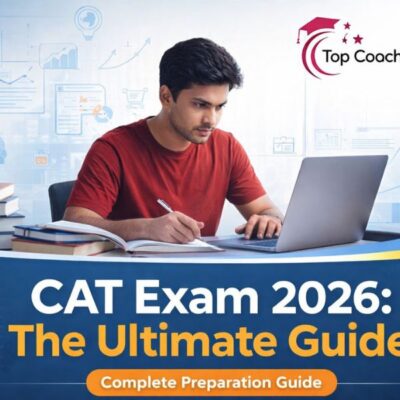The UPSC Civil Services Examination (CSE) is one of India’s most prestigious competitive exams. Every aspirant aiming for IAS, IPS, IFS, or other civil services must understand the detailed UPSC syllabus to crack the exam effectively.
Table of Contents
Overview of UPSC CSE
The Union Public Service Commission Civil Services Examination (UPSC CSE) is one of the most prestigious and competitive examinations in India. It is conducted annually to recruit officers for various top administrative positions in the Government of India, such as IAS, IPS, IFS, IRS, and others.
The examination is held in three distinct stages, each designed to test different aspects of a candidate's knowledge, aptitude, and personality:
1. Preliminary Examination (Objective Type)
This is the first stage of the exam, primarily a screening test to shortlist candidates for the Mains. It consists of two objective-type papers:
- General Studies Paper I: Covers subjects like History, Geography, Polity, Economy, Environment, and Current Affairs.
- General Studies Paper II (CSAT): Tests aptitude, comprehension, logical reasoning, and basic numeracy. This paper is qualifying in nature and requires a minimum of 33% to pass.
Only candidates who qualify the Preliminary exam are eligible to appear for the Mains.
2. Mains Examination (Descriptive Type)
This is the second and more comprehensive stage of the examination. It includes nine descriptive papers, out of which seven papers are counted for merit, and two language papers are qualifying in nature.
The subjects cover a wide range of areas including Essay writing, General Studies, and Optional Subjects chosen by the candidate.
The Mains exam is designed to assess a candidate’s in-depth understanding, analytical skills, and clarity of expression.
3. Interview / Personality Test
Candidates who clear the Mains are called for the final stage: the Personality Test. This is an in-person interview conducted by a board of experts.
The aim is to evaluate the candidate’s personality, decision-making ability, communication skills, integrity, and overall suitability for a career in public service.
🟩 Visit the Official UPSC Website for detailed information, notifications, and updates.
UPSC Prelims Syllabus 2025
The Preliminary Examination is the first stage of the UPSC Civil Services Exam and serves as a screening test to shortlist candidates for the Mains exam. It consists of two objective-type papers, both conducted on the same day.
🔹 Structure of Prelims Exam
| Paper | Name | Marks | Duration | Nature |
|---|---|---|---|---|
| Paper I | General Studies I | 200 | 2 Hours | For merit (cutoff-based) |
| Paper II | CSAT (General Studies II) | 200 | 2 Hours | Qualifying (33% minimum marks) |
- Both papers carry negative marking: 1/3rd marks are deducted for each wrong answer.
- CSAT is qualifying in nature, meaning candidates must score a minimum of 33% (i.e., 66 out of 200) to be considered for Paper I evaluation.
📘 Subjects Covered in Paper I: General Studies I
This paper is crucial for selection to the next stage and covers a wide range of topics related to general awareness and current affairs:
- Current Events of National and International Importance
Regular news analysis, government schemes, international organizations, summits, etc. - History of India and Indian National Movement
Ancient, Medieval, and Modern history with emphasis on the freedom struggle and key events. - Indian and World Geography
Physical, Social, and Economic Geography of India and the World — including climate, resources, maps, and location-based questions. - Indian Polity and Governance
Constitution, Political System, Panchayati Raj, Public Policy, Rights Issues, and more. - Economic and Social Development
Inclusive growth, sustainable development, poverty, demographics, and government initiatives. - Environment, Ecology, Biodiversity, and Climate Change
Environmental issues, ecology basics, climate policies, and biodiversity conservation (general awareness level). - General Science
Basic science concepts and recent developments, especially with application in daily life and current events.
📘 Subjects Covered in Paper II: CSAT (General Studies II)
This paper assesses the analytical and reasoning abilities of candidates. Though it's only qualifying, many students find it challenging and require focused preparation.
Key areas include:
- Comprehension
Understanding and interpreting given passages. - Logical Reasoning and Analytical Ability
Puzzle solving, series, coding-decoding, syllogisms, etc. - Decision-Making and Problem-Solving
Situational judgement-type questions that test ethical and logical thinking (note: currently, these questions usually don’t carry negative marking). - Basic Numeracy (Class X level)
Numbers, averages, percentages, ratios, time and work, time-speed-distance, profit and loss, etc. - Data Interpretation
Charts, tables, and graphs-based questions that test ability to derive insights.
🟦 Read Full CSAT Syllabus (official UPSC link)
UPSC Mains Syllabus 2025
The UPSC Mains Examination is the second stage of the Civil Services Exam. It is a descriptive (written) exam, designed to assess a candidate’s in-depth knowledge, analytical ability, clarity of thought, and written expression. This stage is crucial because it contributes significantly to the final merit list.
📝 Structure of Mains Exam
The Mains exam consists of 9 papers, out of which:
- 2 papers are qualifying in nature (Paper A & B),
- 7 papers are counted for merit.
Each paper is of 3 hours duration, and all papers (except language ones) can be written in either English or any language listed in the 8th Schedule of the Indian Constitution.
📄 Paper-wise Breakdown
| Paper | Subject | Marks | Remarks |
|---|---|---|---|
| Paper A | Indian Language (Qualifying) | 300 | Any regional language |
| Paper B | English (Qualifying) | 300 | Basic comprehension & writing skills |
| Paper I | Essay | 250 | Write 2 essays (choice-based) |
| Paper II | General Studies I – History, Geography, Society | 250 | Indian heritage, world history, social issues |
| Paper III | General Studies II – Polity, Governance, International Relations | 250 | Constitution, governance, global affairs |
| Paper IV | General Studies III – Economy, Environment, Science & Technology | 250 | Economic development, disaster management, etc. |
| Paper V | General Studies IV – Ethics, Integrity, and Aptitude | 250 | Case studies, moral philosophy, attitude |
| Paper VI | Optional Subject – Paper I | 250 | Based on subject chosen by the candidate |
| Paper VII | Optional Subject – Paper II | 250 | Deep knowledge in the chosen discipline |
✅ Qualifying Papers (Paper A & B)
- Paper A: Indian Language (300 marks)
Candidates must choose one Indian language from the 8th Schedule (e.g., Hindi, Tamil, Bengali, Telugu, etc.).
Note: This paper is *not mandatory for candidates from northeastern states (e.g., Meghalaya, Mizoram, Arunachal Pradesh, etc.) without an official regional language requirement. - Paper B: English (300 marks)
Tests basic comprehension, grammar, and writing skills.
Note: Both Paper A and B are qualifying in nature. A minimum of 25% marks (i.e., 75/300) is required to clear them. These marks are not added to the final merit.
📚 General Studies Papers (Paper II to V)
These four papers cover a wide range of topics essential for civil services:
- GS I (Paper II): Indian history, world history, Indian society, and geography.
- GS II (Paper III): Indian constitution, polity, public policy, governance, and international relations.
- GS III (Paper IV): Indian economy, science & technology, biodiversity, environment, disaster management, and internal security.
- GS IV (Paper V): Ethics, integrity, aptitude, and case studies on real-life ethical dilemmas.
📘 Essay Paper (Paper I)
Candidates are required to write two essays, each from a set of topics.
It tests your ability to structure ideas, present arguments, and communicate effectively in writing.
🎯 Optional Subjects (Paper VI & VII)
Candidates must choose one optional subject, and appear for two papers (Paper I & II) of 250 marks each.
Subjects range from:
- Humanities: History, Geography, Sociology, Philosophy, etc.
- Sciences: Physics, Chemistry, Mathematics
- Commerce: Management, Accountancy
- Engineering: Civil, Electrical, Mechanical
- Literature: Indian & foreign languages
🟦 Check Full List of Optional Subjects Here
📌 How to Choose the Right Optional Subject
While all optional subjects have equal weightage, choosing the right one can give you a competitive edge. Consider the following factors:
🟦 Explore Optional Syllabus & Strategy
(Click the link to view UPSC’s official syllabus PDFs for each optional subject.)
Preparation Tips by Top Coaching in Delhi
Preparing for the UPSC Civil Services Examination requires a well-structured strategy, consistent discipline, and expert guidance. Here are some tried and tested tips recommended by top coaching institutes in Delhi, which is considered the hub for UPSC preparation:
📘 1. Build a Strong Foundation with NCERTs
Start your preparation with NCERT textbooks (Class 6 to 12) for subjects like History, Geography, Polity, Economy, and Science. These books provide a clear and conceptual understanding of fundamental topics and are written in simple language — ideal for beginners.
Tip: Make notes while reading and revise them regularly.
📰 2. Stay Updated with Current Affairs
Daily reading of a reputed newspaper (like The Hindu or Indian Express) is essential for GS Papers and the Essay paper. Additionally, refer to monthly current affairs magazines and compilations provided by coaching institutes.
Tip: Focus on editorials, government schemes, policies, and international developments.
🧪 3. Practice Mock Tests and PYQs
Regular practice through mock tests, previous year question papers, and answer writing exercises helps improve time management, accuracy, and presentation.
- Enroll in a Prelims Test Series for regular assessment.
- Join Mains Answer Writing Programs to enhance answer structuring and clarity.
Tip: Start writing answers early, even while preparing for Prelims.
🎯 4. Choose the Right Optional Subject Wisely
Your optional subject contributes 500 marks to your final score, so choose it based on:
- Your interest in the subject
- Academic background or previous exposure
- Availability of study material and mentorship
- Past scoring trends (to some extent)
Tip: Never follow herd mentality — select what suits you best.
🏫 5. Seek Expert Guidance & Mentorship
Joining a reputed coaching institute like Top Coaching in Delhi provides you with:
- Structured syllabus coverage
- Mentorship by experienced faculty
- Regular tests and performance reviews
- Peer learning and group discussions
Such guidance helps you stay on track and avoid common preparation pitfalls.
🟦 Join Our UPSC Mentorship Program
Get personalized guidance, daily study plans, answer writing feedback, and strategic mentorship tailored to your goals.
FAQs
Ans: It includes GS Paper I (current affairs, polity, history, etc.) and CSAT (reasoning, comprehension).
Ans: Yes, it’s qualifying in nature. You need to score 33% minimum.
Ans: 9 papers – 2 qualifying and 7 for merit.
Ans: Yes, there are several literature subjects offered in the optional list.
TCD
Top Coaching in Delhi is a guidance platform that started in 2024 with the mission to provide authentic and traditional information about exams and coaching institutes. The portal is dedicated to helping students find the best coaching centers for various competitive exams, including UPSC, SSC, NEET, JEE, CUET, UGC-NET, CLAT, NATA, and Judiciary






